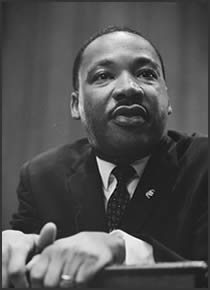MLK
January 16, 2012
By Sinclair Soul
 Martin Luther King, Jr. lived is life as an American is an American clergyman and activist. Forty-three years after his death, he is regarded as as an American philosopher and hero. Of course, he is best known for his role in the advancement of civil rights, using strictly nonviolent methods inspired by the teachings of India’s Mahatma Gandhi. King was a deeply religious man who, as a Baptist, joined with a Quaker group to visit Gandhi’s birthplace in India in 1959. This trip profoundly affected King and he emerged more committed than ever to use non-violent means during his struggle for African-American civil rights. In a radio address, King stated;
Martin Luther King, Jr. lived is life as an American is an American clergyman and activist. Forty-three years after his death, he is regarded as as an American philosopher and hero. Of course, he is best known for his role in the advancement of civil rights, using strictly nonviolent methods inspired by the teachings of India’s Mahatma Gandhi. King was a deeply religious man who, as a Baptist, joined with a Quaker group to visit Gandhi’s birthplace in India in 1959. This trip profoundly affected King and he emerged more committed than ever to use non-violent means during his struggle for African-American civil rights. In a radio address, King stated;
“Since being in India, I am more convinced than ever before that the method of nonviolent resistance is the most potent weapon available to oppressed people in their struggle for justice and human dignity. In a real sense, Mahatma Gandhi embodied in his life certain universal principles that are inherent in the moral structure of the universe, and these principles are as inescapable as the law of gravitation.”
During the 1960s, Dr. King led many campaigns throughout the American south to promote civil rights. However, unlike many civic leaders of today, Martin Luther King refused to align himself with any political party. In fact, President John F. Kennedy, who King later admitted he voted for in 1960, was opposed to the 1963 March on Washington on political grounds, and personally requested that King cancel it, but MLK took a principled stand.
Here King delivered his immortal “I Have a Dream” speech where he expanded American values to include the vision of a color blind society. Towards the end of the carefully outlined speech, he improvised an anaphoric refrain with passion and clarity, giving the speech its name and history a memorable phrase. In 1964, King became the youngest person to receive the Nobel Peace Prize and he continued his non-violent fight for civil rights up until his death in 1968.
I used to discount King’s value because his goals were self-motivated, and I felt in was rational self-interest for one to fight for one’s own rights. I was wrong then, as I’ve come to realize how couragous it is put one’s own livlihood and life on the line to fight the status quo. Unlike today, where many will stand up for causes or issues from afar and through peer groupthink, the civil rights marchers were true American heroes and Dr. Martin Luther King Jr. was first among them.
~
 Sinclair Soul is a championship-level background singer and now political columnist for BigBlueBullfrog.com. His column, “The Soul of the Nation” thoroughly examines the state of American politics and culture from a Soul perspective.
Sinclair Soul is a championship-level background singer and now political columnist for BigBlueBullfrog.com. His column, “The Soul of the Nation” thoroughly examines the state of American politics and culture from a Soul perspective.

